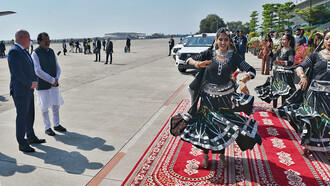The bombarded of Kiev supports Greek allegations.
On Europe’s border with the Middle East, there is a man with grand visions. The president of Turkey wants a dynamic economy like that of Southeast Asia, while also drawing inspiration from Islamic devotion as well as the power of the Ottoman Empire. Like the Sultans who ruled through fear and displays of opulence.
(Die Welt Deutschland)
Two countries, Ukraine and Greece, are currently facing similar unprecedented challenges. Both countries have large and aggressive neighbours to the east who demand their land while being at the same time indifferent to international law. For them, boundaries do not exist and consider themselves free to invade and occupy them. They urge Ukraine and Greece to exercise less sovereignty over their territories by demilitarizing regions. Also, the instrumentalisation of migration and the disruption of energy flows are among their aggressive tools against the West.
The Turkish side has fully adopted the Russian methods involving the threat of invasion in Greece which they threaten to be realized as was the case with Ukraine. The war of propaganda and personal attacks against the leaders of the two countries is part of the hybrid war. They hope to blackmail Greece and occupy the islands of the Aegean Sea as the Turks did precisely in Cyprus also forcing the Americans inside Greece (American bases) to withdraw. Also, swinging between East and West is a way or tool of achieving their target. The Russians have already secured access to Turkey's sensitive departments and units. Secret plans between V. Putin and R.T. Erdoğan find their realization now. The threats made by the Turkish side are clear: "Be careful if you do not want to become Ukraine". Unfortunately, the potential for Turkey to imitate the Russian invasion of Ukraine remains high.
Turkey is blackmailing the EU to halt energy projects in the Eastern Mediterranean, in which major energy projects are developing with Greece, Israel, Egypt and Cyprus in the center. At the same time, enormous Russian aid is being sent to Ankara to break away from NATO and the United States. The intelligence also says that the object of all this is to join forces in the Middle East against Israel. The way the Turkish regime reacts is a big problem, but accusations are multiplying very often lately. The secret Turkish projects that underlie a great Islamic union against the infidels, as they call it, are ongoing.
There are numerous reasons for concern about Turkish projects. Journalists worldwide have accused Turkey of allowing international terrorist elements to come together. The incident in Istanbul where Hamas operatives met with Hizbullah counterparts to discuss regional issues raised concerns among security officials. During the meeting, senior religious officials covered the gathering. In addition, radical and extremist fighters move freely across the country and toward hotspots in the Middle East region such as Iraq and Syria. Together with these extremists, drug smuggling, people smuggling and militants flow find their way out. The choice of Istanbul a city once the capital of the notorious Ottoman Empire was not accidental. An empire characterized once by systematic plundering, converting churches to mosques together with converting indigenous people to Islam by the sword, and head tax (jizya), the inferior Dhimmi status provides the radical background. We must not omit in our analysis the horrible events of devshirme, invasion, raping, and sex slavery, which create the ideal framework for the terrorist meeting.
There are also rumors that senior Turkish officials are supporting the secret negotiations on terrorism, hoping that successful results will soon be achieved. Info compares Turkish President Recep Tayyip Erdogan to the North Korean dictator, Kim Jong Un and the late Libyan leader Muammar Gaddafi.
But a new issue came into the blackmail business. The Nuclear one. Turkish president once again presented the pursuit of nuclear weapons during his speech at the UN General Assembly. He says often that several countries have missiles with nuclear warheads, and that he cannot accept it. Now it is understandable why Ankara started working closely with the Russian company Rosatom to build a large reactor complex somewhere on the Mediterranean coast. Russian experts and scientists with connections to the security services will provide personnel for the factory. It is believed that Turkey, with the support of Russian technology, will seek to build a plutonium bomb, possibly from spent fuel.
The Turkish government has expressed its admiration for the ‘Iranian model’ which is the way they used and steps they followed for the acquisition of a nuclear weapon. This means among others secretly producing related material as part of a civilian nuclear program. The latest information indicates that the Turks have already acquired suitable centrifuges for nuclear enrichment probably from Pakistan which also supplied Turkey with the necessary electronics. In Turkey they say it's Pakistan’s turn to help their country since it is their country, it once helped Pakistan to develop its nuclear weapons program. High-level scientists coming from Pakistan are now working with Turkey to enhance ballistics and also develop nuclear capabilities. Pakistan has started aiding Turkey by transferring missile technologies. In addition, Turkey has already been struggling to secretly acquire a large number of centrifuges. The reports describe how Turkish companies have allowed Pakistani nuclear scientists to illegally trade nuclear technologies in their country.
Thus, through this collaboration with Pakistan, Turkey has gained experience in the «nuclear black market». It is thus not surprising to hear accusations of continuous nuclear scientific exchanges between the two countries. The accusations were reinforced by a series of meetings between senior representatives of the armies of both nations. The result is nuclear weapon ambitions and the black-marketeering of nuclear technology to threaten the peace and tranquillity of countries worldwide from the North Atlantic to the Middle East. The appearance in the nuclear game of the ambitious Turkish President Tayyip Erdogan, whom some Western leaders publicly call a dictator, is a source of additional headaches. Geopolitical experts believe that Turkish leaders view Pakistan's nuclear and missile capabilities as a tool for realizing its caliphate aspirations.
But let us not turn our thoughts away from the developments in the Middle East. It seems now the security issues of missiles represent radically important parameters. They played a very significant role in the doctrines of national defence in the area. Many states believe that the acquisition of some sort of missile arsenal will frighten neighboring states as symbols of superior military capability. Such beliefs in the Middle East are supported by the evolving missile landscape. The intentions of various regional powers interested in advanced missiles and related technology are obscure. The regional interplay between offensive and defensive missiles is hard to follow. Attempts have been observed recently in the development of regional arms controls but it is not without obstacles.
In this turbulent framework, Turkey plays a radical leading role. Although the country has signed specific treaties as a non-nuclear-weapon state, meaning that it has agreed to give up developing or acquiring nuclear weapons, it has recently decided not to keep its promises. Contrary to its obligations and promises, Turkey is secretly trying to develop nuclear capacities aimed at establishing its position as an autonomous political pole with Eurasian scope. It aims to influence the environment in the Middle East. In this regard, Turkey believes that nuclear bombs ensure a place at the forefront of geopolitical issues. An idea that Erdogan likes very much.
Illusions may someone say. But Erdogan's intentions to build for his country an improved status similar to a global power have just started. The cooperation with Russia which started with the deliveries of the Russian S-400 missile defense system was just the beginning of the plot. But the intrigue of Turkey's rapid development and production of nuclear technologies and missiles caused a major security problem. In particular, there will be issues in the current Euro-Atlantic security architecture. And not only.
There are going to be issued with the growing conflict of interest with the United States. Fears of destabilization must be addressed not only by the United States but by the West in general, related to the nuclear arms race in the region. The world and particularly Europe are reacting but slowly. Because of the unprecedented challenge, the internationalization of Turkish aggression toward allies and partners on one hand and building alliances with those sharing the same principles and values seems the best way to respond. Based on compliance with fundamental principles and international law, we can determine our joint response.
The situation is complicated by the fact that Turkey's actions constantly threaten regional stability. Also, states in the region are seriously concerned by such developments starting to develop their own missile defense capabilities thus complicating regional status. The situation is getting worse since the invitation of non-state actors, such as Hezbollah in the operation of various missile systems, concerns many crucial states like Israel. Terrorist groups with advanced military capabilities in their hands are a nightmare. Missiles in such hands may be used as an invaluable tool for them towards inflicting physical damage and economic harm against their stronger and better-equipped opponents.
The Middle Eastern missile landscape, with or without nuclear weapons, is undergoing significant transformation. Wide interest has been recorded in the development of missile technology having in mind the influence of regional equilibrium. Strong attention to the developments must be given before it is too late.















